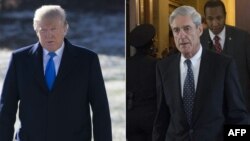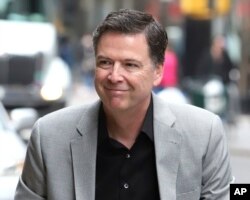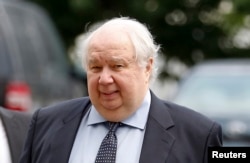Legal experts cast doubt Tuesday on a list of questions the special counsel purportedly wants to ask President Donald Trump, saying they would expect the veteran prosecutor to ask more and more pointed questions.
The New York Times published the list of 44 questions it said special counsel Robert Mueller plans to pose to Trump as part of his investigation into Russian interference in the 2016 election.
The newspaper reported that the list was compiled by Trump's lawyers based on questions that were read to them by special counsel investigators.
The largely open-ended questions range from queries about Trump's firing of former national security adviser Michael Flynn and former FBI director James Comey, to general inquiries into what Trump knew about alleged coordination between his 2016 presidential campaign and Russia.
While the list reflects the general line of questioning the special counsel's investigation is believed to be focused on, legal experts said the questions published are not what Mueller — or any prosecutor for that matter — would ask an interview subject.
"It doesn't sound like questions that a prosecutor would typically ask, unless it was just a very general information-gathering type of inquiry, and they'd not limit themselves to only those question and reserve the right to ask follow-up questions," said Eric Jaso, a partner at the Spiro Harrison law firm who served as an associate independent counsel during the Whitewater investigation of former President Bill Clinton.
The questions, Jaso said, were likely written by Trump's own lawyers, based on a conversation with the special counsel about topics he wants to query.
"If Mr. Mueller is going to interview the president, I suspect that he's going to ask rather pointed questions rather than having questions that would allow the president to basically give a narrative and potentially go far afield from the topics that they're trying to focus on," Jaso said.
Paul Rosenzweig, an adjunct professor at the George Washington School of Law and a senior fellow at the R Street Institute, said that each query on the list is likely to spark a litany of follow-up questions.
"For example, if you ask, 'What did you know about the meeting in Trump Tower?' and the president says, 'I knew they were meeting with someone from Russia,' that means there is a hundred more questions to ask — How did you know that? Who told you? Did you learn that before the meeting or after? What did you think of that? Did it concern you?" Rosenzweig said.
'Disgraceful' leak
Though prosecutors do let interview subjects know their planned areas of questioning, rarely do they share specific questions in advance.
"Going back to my experience with Whitewater, I'm not aware that we ever shared specific questions with the president's counsel," Jaso said.
Trump denounced as "disgraceful" the leak of the list, which the Times said was provided by someone outside the president's legal team.
The special counsel's office declined to comment.
The questions — five related to Flynn, 18 about Comey, eight related to Attorney General Jeff Sessions and 13 centered on possible Trump campaign coordination with Russia — are for the most part open-ended.
"What did you know about phone calls that Mr. Flynn made with the Russian ambassador, Sergey I. Kislyak, in late December 2016?" one purported question asks in reference to conversations Flynn denied having, prompting Trump to fire him.
"What involvement did you have in the communication strategy, including the release of Donald Trump Jr.'s emails?" another question asks about a June 9, 2016, Trump Tower meeting between Trump campaign officials and a Russian lawyer.
Sharp-edged questions
Rather than posing queries that would allow a witness to go off on a tangent, prosecutors tend to ask sharp-edged questions and often confront subjects with documents and testimony from other witnesses.
Clinton faced hundreds of pointed questions when he testified for over four hours before a grand jury in 1998. Armed with documents and statements the former president had previously provided, prosecutors began by questioning Clinton about his characterization that he had no "sexual relations" with former White House intern Monica Lewinsky.
"Mr. President, were you physically intimate with Monica Lewinsky?" was the prosecutor's first close-ended question about the topic.
"Was this contact with Ms. Lewinsky — Mr. President, did it involve any sexual contact in any way, shape or form?" followed another question.
When Clinton said his relationship with Lewinsky, while not sexual in nature as he understood it, was nonetheless "inappropriate," the prosecutor produced one of the former president's statements that indicated otherwise.
"If you look at those questions there, they're extremely focused and extremely pointed," Jaso said of Clinton's testimony. "They make frequent references to specific documents or other people's testimony that's already in the record."






